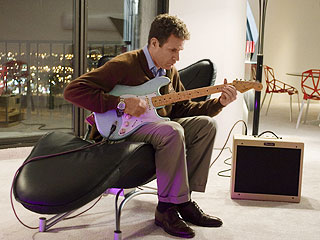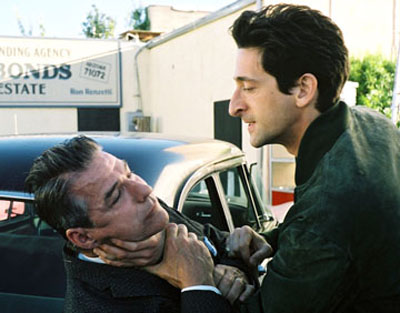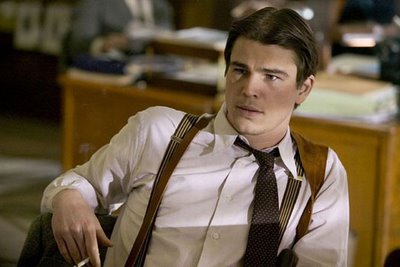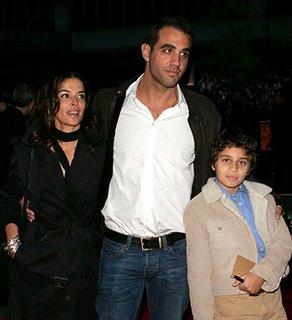Inland Empire
The Fountain
Miami Vice
Monster House
United 93
Patricia Field (The Devil Wears Prada)
Nancy Steiner (Little Miss Sunshine)
Robert Lever (MirrorMask)
Catherine Marie Thomas (A Prairie Home Companion)
Margot Wilson (The Proposition)
Inland Empire
The Fountain
Miami Vice
Monster House
United 93
Patricia Field (The Devil Wears Prada)
Nancy Steiner (Little Miss Sunshine)
Robert Lever (MirrorMask)
Catherine Marie Thomas (A Prairie Home Companion)
Margot Wilson (The Proposition)

Teresa Mastropierro (Forty Shades of Blue)
Not the first thing you might single out for celebration in this beautifully acted character piece, but I found the sets — from Torn and Korzun’s chilly, MC Escher-like Memphis pad, to the dilapidated manse where they attend a garden party as the relationship’s crumbling — astonishingly apt and memorably furnished.
James Chinlund (The Fountain)
Dave McKean and crew (MirrorMask)
The design for this film kicks all known ass, and though there’s a fair bit of animation, the digital effects actually impress less than the surrounding collage of sets, painted backgrounds and bric-a-brac props, not to mention a wonderful half-real circus, and the haunting choice of the grimly palatial Embassy Court in Brighton (now renovated, I gather) as the heroine’s home turf.
Ed Verreaux (Monster House)
Responsible — along with the reliably raspy Kathleen Turner — for one of the year’s best characters: The House, which from attic to basement had a marvellously forlorn aspect and vicious, groaning, cackling personality bursting out from under its floorboards.



 I'm still turning The Fountain over. I like it. I like Hugh Jackman in it. I like the movie's swooning ambition, the tactile ways it teleports itself through the centuries. I admire the feverish quality of its overlapping certainties, and the ways Aronofsky wants to both conjure and unlock some essential mysteries here.
I'm still turning The Fountain over. I like it. I like Hugh Jackman in it. I like the movie's swooning ambition, the tactile ways it teleports itself through the centuries. I admire the feverish quality of its overlapping certainties, and the ways Aronofsky wants to both conjure and unlock some essential mysteries here.

 A shout-out once again to StinkyLulu, the web hostess with the mostest and our monthly go-to-gal for debating the issues that really matter. In this case it's who deserved Best Supporting Actress in 1974, when by unanimous consensus Ingrid Bergman pulled a Zellweger and defeated four better rival performances than her own (in the stuffy and smug Murder on the Orient Express). By no one's reckoning was it a great year for the category — co-smackdowner Nick thinks it might even have been the worst ever — but I differ in having enjoyed the comic va-va-voom Madeline Kahn injects into the otherwise rancid Blazing Saddles, the blowzy vitality of Diane Ladd as a harassed diner waitress in Scorsese's Alice Doesn't Live Here Anymore, and the touching, flavourful work of Valentina Cortese (the overall favourite) as a diva crumbling on set in Truffaut's faintly disappointing film-about-filming Day for Night. Plus, I was the only one who had much time for Talia Shire in The Godfather, Part II, debate about whom still rages in the comments below. Do you hate her or rate her? Post away. Mention has been made of the unnominated, as ever: Karen Black, who I dimly remember being marooned and miscast like almost everyone in The Great Gatsby, Kahn and the hysterical Cloris Leachman in Young Frankenstein, and, my personal picks, the even more memorable double-act of stay-at-home girlfriends Ann Prentiss and Gwen Welles in Altman's fantastic California Split. (Pic above, and a tip: Altmaniacs wanting to commemorate his passing in some way could do a lot worse than tracking down this underappreciated flick. I think it's one of his very best.) Next month: 1975, and another one.
A shout-out once again to StinkyLulu, the web hostess with the mostest and our monthly go-to-gal for debating the issues that really matter. In this case it's who deserved Best Supporting Actress in 1974, when by unanimous consensus Ingrid Bergman pulled a Zellweger and defeated four better rival performances than her own (in the stuffy and smug Murder on the Orient Express). By no one's reckoning was it a great year for the category — co-smackdowner Nick thinks it might even have been the worst ever — but I differ in having enjoyed the comic va-va-voom Madeline Kahn injects into the otherwise rancid Blazing Saddles, the blowzy vitality of Diane Ladd as a harassed diner waitress in Scorsese's Alice Doesn't Live Here Anymore, and the touching, flavourful work of Valentina Cortese (the overall favourite) as a diva crumbling on set in Truffaut's faintly disappointing film-about-filming Day for Night. Plus, I was the only one who had much time for Talia Shire in The Godfather, Part II, debate about whom still rages in the comments below. Do you hate her or rate her? Post away. Mention has been made of the unnominated, as ever: Karen Black, who I dimly remember being marooned and miscast like almost everyone in The Great Gatsby, Kahn and the hysterical Cloris Leachman in Young Frankenstein, and, my personal picks, the even more memorable double-act of stay-at-home girlfriends Ann Prentiss and Gwen Welles in Altman's fantastic California Split. (Pic above, and a tip: Altmaniacs wanting to commemorate his passing in some way could do a lot worse than tracking down this underappreciated flick. I think it's one of his very best.) Next month: 1975, and another one.





 Read more than a handful of the glowing reviews for Scorsese’s latest and you may detect — beneath the rote praise for Thelma Schoonmaker’s slightly uncertain editing, the justified plaudits for what DiCaprio’s doing, and a whole load of starstruck raving about one of the least disciplined performances of Jack Nicholson’s career — a heavy sigh of relief. He’s pulled it off, is the implication: the movie’s no masterpiece, but it works.
Read more than a handful of the glowing reviews for Scorsese’s latest and you may detect — beneath the rote praise for Thelma Schoonmaker’s slightly uncertain editing, the justified plaudits for what DiCaprio’s doing, and a whole load of starstruck raving about one of the least disciplined performances of Jack Nicholson’s career — a heavy sigh of relief. He’s pulled it off, is the implication: the movie’s no masterpiece, but it works.